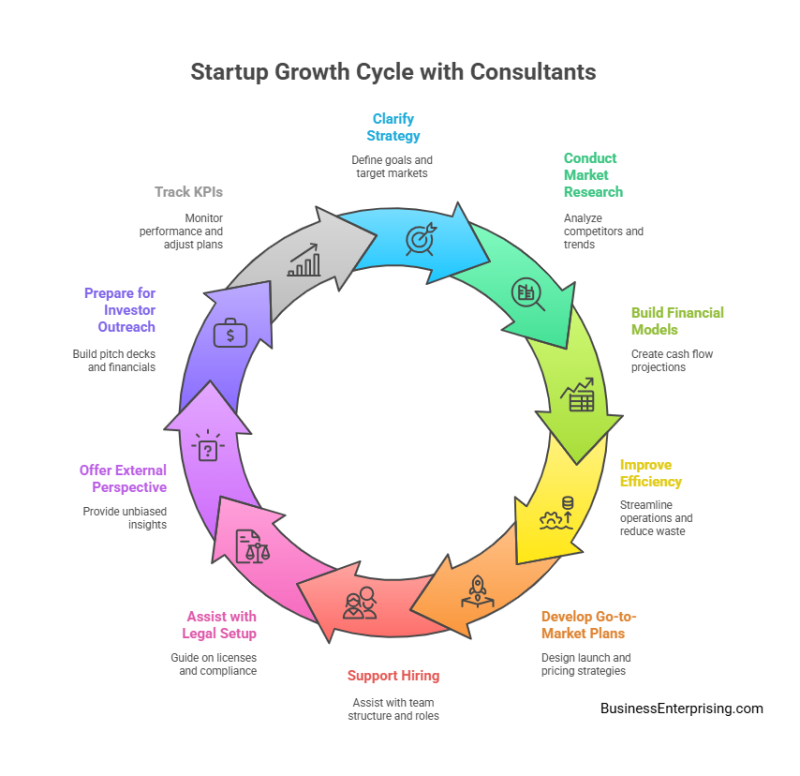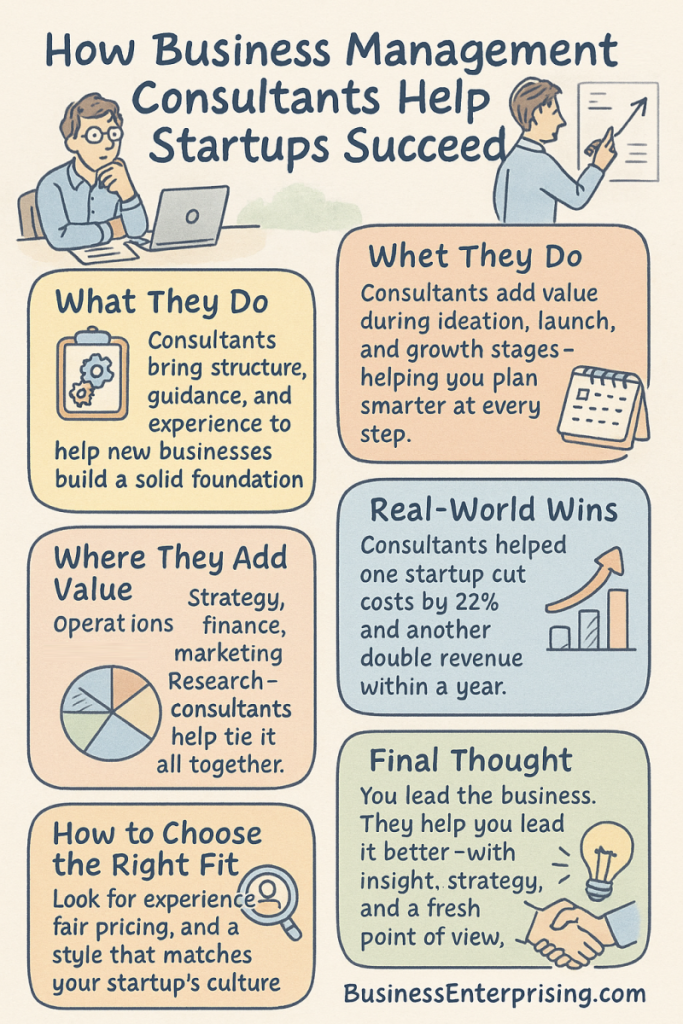
Launching a startup often feels overwhelming. However, outside guidance can help you move with more confidence. You might know your product well, but still need help with planning, operations, or marketing. Additionally, working with a consultant can give you tools that improve how you think and work.
Not every founder wants help, especially early on. Some believe consulting is only for large companies with big budgets. However, many consultants now work with startups and small teams. They often tailor services to fit early-stage businesses with limited resources. Therefore, they meet you where you are and help you grow smarter.
Additionally, a consultant can help you stay on track. You already wear multiple hats, and time is limited. They bring clarity to what matters most. You stay in control of your business while gaining valuable insight. That kind of support can shift your results faster than trying to fix things alone. Hiring a consultant is not about weakness. It’s about working smarter. You bring the vision. They bring the process. Together, you improve how the business runs and how fast it grows.
What Is a Business Management Consultant?
A business management consultant helps you make smart decisions when launching or growing your company. These professionals offer guidance based on experience, research, and tested strategies. Their job is to spot issues, suggest improvements, and help your business run more efficiently. Most startups face unknowns. Therefore, having someone with outside perspective can help you avoid mistakes. Business management consultants typically support new ventures with planning, operations, and financial structure. Additionally, they can assist with competitive analysis, pricing models, and even hiring strategies.
You don’t need to know everything when starting a business. However, you do need access to sound advice. That’s where a consultant can make a real difference. For example, they might refine your business model or help you prioritize goals. They also work on marketing approaches, customer targeting, and budget control. Therefore, if your business needs structure or clarity, a consultant may be the right fit. Business Management Consultants work on short or long-term projects. Some offer strategic planning, while others focus on operational systems or sales process development. Additionally, many provide support during investor presentations or funding efforts.
Startups often run lean and fast. That can lead to rushed decisions or missed opportunities. However, with the right consultant, you can stay focused while building a solid foundation. Their outside perspective brings practical insights that help you act more confidently. You are still in control of your business. A consultant simply gives you tools to think critically and act strategically. That kind of support can shorten your learning curve and improve your chances of success. They are not a substitute for leadership but a resource to help you lead better.
The Startup Lifecycle: When to Engage a Consultant
The timing of hiring a consultant can shape how your startup performs. Some founders wait too long to get help. That delay can lead to mistakes, wasted funds, or slow progress. Therefore, understanding when to bring in outside expertise can protect your time and budget. During the ideation phase, a consultant can help you refine your concept. Additionally, they can evaluate market fit, pricing, and competitors. Early support allows you to test assumptions and focus your efforts. You do the creative work while they bring structure and clarity to your thinking.
However, the launch stage often requires even more attention. At this point, you must handle setup, hiring, and marketing. Business Management Consultants can offer tools to build a lean operation. They also support financial planning, vendor selection, and customer acquisition strategies. Therefore, they help you set priorities when resources are tight. You may also want support during the growth phase. At that stage, your time becomes limited and your decisions carry more weight. A consultant can help you fix bottlenecks, build teams, and expand into new markets. Additionally, they bring experience that helps you avoid growing too fast or too slow.
Some startups hire consultants only after problems arise. However, working with one early can prevent those issues altogether. You keep control of your business, but gain insight that saves time and reduces risk. Every stage has its own demands. Therefore, think about where your business stands and what’s coming next. If you face tough choices or feel unsure, a consultant may help you move forward with confidence.
Core Areas Where Consultants Provide Value to Startups
Business Management Consultants often help startups make better choices across several key areas. Their input supports structure, planning, and growth. Each area requires a different skill set, but consultants bring experience that connects all the parts. Strategic planning is one of the first areas where they add value. You may have ideas, but not a clear path forward. Therefore, a consultant helps you define direction, goals, and next steps. Additionally, they test your assumptions and help you prioritize actions that support long-term growth.
Market research is another critical area. You need to know who your buyers are and what they need. However, many startups skip this step or guess. Consultants can gather data, assess demand, and identify gaps your product might fill. This helps you position your offer with greater confidence. Financial modeling also benefits from outside help. You must understand how revenue, cost, and cash flow fit together. Business Management Consultants build simple models to help you plan ahead. Additionally, they create break-even forecasts and funding estimates. That makes it easier for you to present your business to lenders or investors.
Consultants also focus on day-to-day operations. If your systems are disorganized, growth will be harder. Therefore, they can improve workflows, hiring, and performance tracking. They also help set clear roles and reduce waste. Finally, go-to-market strategies are key to gaining traction. You need a solid marketing plan that matches your budget. A consultant can help you refine your offer, pricing, and outreach. Additionally, they track results and recommend adjustments so you improve over time.
Case Studies: Real-World Impact of Business Consultants
Many startups have improved performance by working with consultants. These gains often come from better planning, clearer processes, or tighter financial control. Results vary by company, but the impact can be significant. One software startup hired a consultant during its launch phase. At that time, their pricing model was unclear. Therefore, the consultant reviewed their product features and ran a market analysis. The result was a new pricing structure that increased sales by 40 percent in three months. Additionally, they reduced customer churn by aligning pricing with value.
Another company sold eco-friendly packaging. However, they struggled with production delays and rising costs. Business Management Consultants helped them restructure their supply chain. Within six months, the startup cut production costs by 22 percent. They also reduced lead times, which allowed for more customer orders. A third startup developed a niche fitness product. They had strong demand but lacked a growth strategy. Therefore, they brought in a consultant to map their expansion. The consultant built a go-to-market plan and trained the sales team. As a result, the company doubled revenue in its second year. Additionally, they secured a distribution deal with a major retailer.
You do not need to face every challenge alone. These examples show that outside support can lead to clear wins. A consultant won’t run your business for you. However, they will bring focus, clarity, and strategy when it matters most. You gain knowledge and tools that last beyond the project. That’s the long-term value of working with someone who knows what to look for and how to improve it.
How to Choose the Right Consultant for Your Startup
Choosing the right consultant takes more than a quick search. You need someone who fits your goals, values, and work style. Not every consultant will match what your startup needs. Therefore, take time to evaluate their background and process. Start by reviewing industry experience. A consultant should understand your market or have worked with similar business models. Additionally, ask how they’ve helped companies like yours. However, don’t overlook their ability to adapt. You want someone who listens and adjusts rather than pushing a one-size-fits-all plan.
Pricing also matters. Therefore, request clear details on how they charge. Some consultants offer flat fees, while others bill hourly or by project. Make sure the pricing fits your budget and expected outcome. Additionally, confirm what deliverables are included. Compatibility with your startup culture is just as important. You’ll work closely with this person, so values and communication style must align. Business Management Consultants who understand startup pressure and limited resources tend to be more flexible and efficient. They should work with you, not above you.
You should also consider their engagement model. Will they meet weekly or just deliver a final report? Some founders need hands-on support. Others prefer strategic advice without long calls or ongoing meetings. Therefore, be honest about what you need and how involved you want them to be. The right consultant won’t just look good on paper. They’ll challenge you, bring structure, and support your goals. Additionally, they’ll do it in a way that feels productive, not forced. That kind of fit helps you make better decisions and move forward with confidence.
Common Misconceptions About Hiring Consultants
Many startup founders hesitate to hire consultants because of common misconceptions. Some think consultants cost too much or slow things down. Others worry about losing control of their business. However, these fears often come from bad information or past experiences with the wrong people. One major myth is that only large companies hire consultants. That is not true. Startups often benefit more because they need fast, focused input. Additionally, Business Management Consultants can step in short-term to solve specific problems. You don’t need to commit to a long contract or hire full-time staff.
Another common belief is that consultants take over decision-making. However, a good consultant does not replace your leadership. They offer tools and advice so you can make better decisions. You still run the business. Therefore, you keep control while gaining an outside point of view. Cost is also a major concern for many founders. However, hiring a consultant is often cheaper than making a bad hire or launching without a plan. Additionally, many consultants offer flexible pricing to fit smaller budgets. Their goal is to bring value, not create debt.
You may also think consultants slow things down with long meetings or thick reports. That depends on who you hire. A skilled consultant works quickly, delivers clear insights, and respects your time. Therefore, look for someone who focuses on outcomes, not fluff. The right consultant should feel like a partner, not a cost center. They support your goals without taking control. When chosen carefully, consultants can save you time, cut waste, and help you grow more efficiently.
Conclusion
Hiring a consultant does not mean you have failed. It means you value expertise and want better results. Every startup faces unknowns. Therefore, getting outside help can reduce costly mistakes and move your business forward faster. Business Management Consultants support your decision-making with facts, tools, and experience. They don’t replace your role. Instead, they strengthen it. Additionally, they help you plan, operate, and grow with more confidence. That kind of input can save you time, money, and effort.
Some consultants work on short-term projects. Others stay involved during key growth stages. Therefore, you can choose a model that fits your goals. However, no matter the arrangement, the focus stays on performance and progress. You stay in control. They help you sharpen your focus and avoid waste. Additionally, consultants bring value through strategic thinking, better systems, and tested methods. Their input can help you prepare for funding, build a team, or enter new markets. They also provide accountability so you follow through on plans.
If you want better clarity, more structure, or smarter decisions, consider bringing someone in. The cost often pays for itself when you apply what you learn. However, you must choose carefully. Find someone who fits your needs, budget, and values. You don’t need to figure everything out alone. You can still lead your company while gaining an experienced partner along the way. That support makes your path forward a little clearer, and your next steps easier to take.



